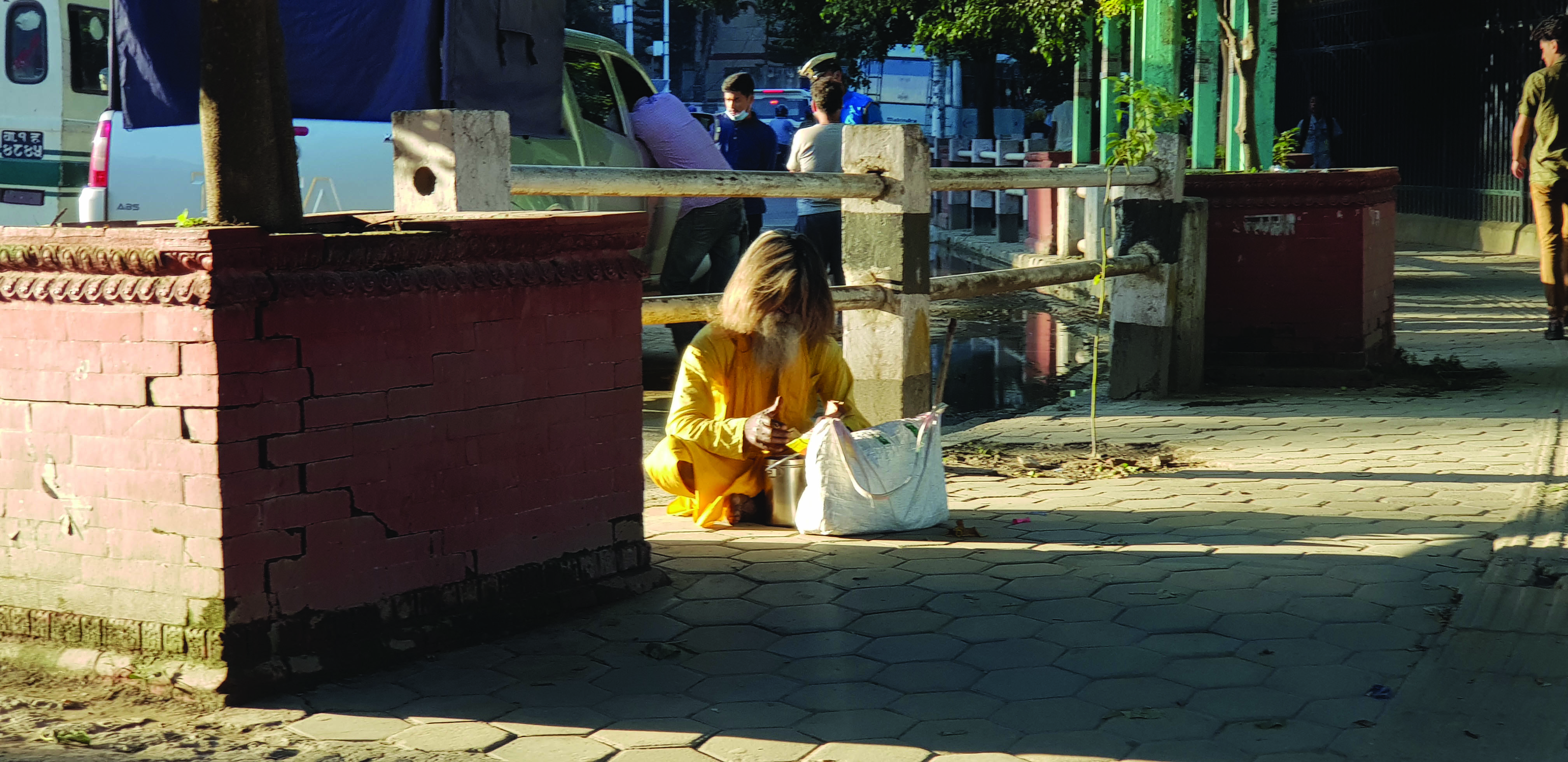
OR

Who will speak for this country and boost its image internationally? Who will stand for accountability, transparency and democracy?
In this piece, yours truly will not be analyzing big data to show how the economic slowdown gripping the dear neighbor will affect us, why it is an indication of the recession of global proportions and how it may affect the Nepali economy in multiple ways like remittance inflow, escalation in international market prices, so on and so forth. Yours truly leaves it to the analysts (of which there’s no dearth in Nepal) to divine upon the larger meaning of the recession. This time, yours truly will just read into some random pictures that he took, scenes that he came across and what they probably mean for a ‘new’ Nepal.
Before that, let yours truly dare to start with a few quotes about pictures. A picture speaks a thousand words. Just a paltry thousand words? A classic case of lack of imagination, isn’t it?
A picture is worth a thousand words. Merely a thousand words? For a thousand word article, how much do you get? Obviously, it depends on how big a name you are in Nepal’s informal thought industry. A picture is worth ten thousand words. That’s just a bit better valuation of a picture, but does not do justice to a nice shot.
In fact, none of these expressions come close to the true worth of a real good picture. Yours truly feels he knows, to some extent, how invaluable a picture is, having already worked for a considerable portion of his career as a desk hand in a section of Nepal’s English media by editing (read ruining) a huge number of masterpieces from reporters covering different beats using their very own distinctly flavored versions of English.
In those troubling times, among other stories, yours truly would often get interesting reports about marvelous finds like ancient bungalows, mysterious caves located in the midst of deep woods somewhere in Nepal, some never-before-seen flora and fauna as well as heart-rending stuffs about fellow Nepalis afflicted by diseases, disasters, hunger, the Maoist insurgency, etc.
Quite a bit of polishing and the bungalows would shine! After removing the cobwebby webs and scaring away the owls and bats, the cave would be perfectly habitable! With a bit of rewriting, those flora and fauna would indeed look more beautiful. With a bit of empathetic editing, those stories of the suffering lot would make the state take some relief measures.
At the end of the shift marked by polishing (read ruining) of a good number of masterpieces, a quick flight of imagination would take yours truly to those caves, bungalows and exotic spots that were the habitats of such and such exotic plants and animals. His happiness would know no bounds upon finding those dwellings to be indeed empty, those flora and fauna to be beautiful beyond words!
The regret is that yours truly never dared to venture out of the concrete jungle in search of those bungalows, those caves hidden somewhere amid those magical woods with never-ending supply of game, medicinal herbs, clean and fresh air and water. Not choosing to shift to any of those mysterious and magical places meant ruining more and more masterpieces about a myriad crises compounded by the decade-long insurgency, unrest in the southern plains over promulgation of the constitution through a popularly-elected Constituent Assembly, international conspiracies against the country and a vision-less political leadership presiding over the whole show. In those troubling times, remaining sane was the toughest challenge. It still is.
For the sake of brevity, let yours truly now talk about those random shots.
Scene 1
While sipping coffee at a tourist hub after a hard day’s work, yours truly came across this rickshaw-puller talking with two Indian tourists. In a barely understandable Hindi, this poor man was trying to convince the tourists that the rickshaw was the only means of transport for them in the direction they were heading as it was a one-way gully. All he was asking for was a mere
Rs 100, while the tourists were adamant that they would take the taxi instead. Before I could explain the thing for the ease of both, the tourists vanished into I don’t know where.
Of course, Chandrayana-02 like vessel would not have been able to navigate the crowded streets and come to the rescue of the two tourists. With a little bit of explaining in understandable Hindi, the poor man would have got his business.
In retrospect, yours truly feels learning languages spoken in the neighborhood would do us no harm. Rather, it would help us understand each other better. Who knows? A reasonably good command of Hindi, Mandarin and English on the part of tour operators and other tourism crew may work wonders when it comes to bringing in two million tourists during Visit Nepal Year 2020.
The spectacle at the tourist hub once again proves we need to do a bit more than we are doing, if we are really to benefit from the ‘prosperity’ of the dear neighbor instead of bearing the brunt of its poverty in view of increasing influx of unchecked populations through an open border at a time when economic depression is hitting it very hard.
Otherwise, we will keep losing business like the poor man did in that tourist hub. An afterthought: Doesn’t the scene that I briefly explained speak thousands and thousands and thousands of words?
Scene 2
Commissioning of a project is underway. There are engineers and technical support staff galore, mostly from India, South Korea and China. In this whole project requiring high-end technical skills, Nepali nationals are very few and far between, I find upon conversation with concerned officials there.
At the inaugural function, though, there’s one more Nepali national to perform some Vedic ritual.
Of course, Vedic mantras, I feel, have the powers to calm our heart, mind and soul. But in this day of cutting-edge technology, we need far more than just ancient, theoretical knowledge to fight modern-day problems. If we do not rise up to the occasion and develop capabilities to fight modern-day problems head on, yours truly fears even Pundits from around the world will come to our country to perform these rituals. Will the Nepali state play some role in equipping its citizens with high-end skills and knowledge to turn the country into a knowledge and high skills-based society?
Scene 3
In this land of never-ending Jatras, one more Jatra was going on in full swing at where else but Tundikhel. Cavalrymen were performing their feats as part of preparations for the yearly Fulpati celebrations which the President and the Supreme Commander-in-Chief of the Nepali Army attend along with several other dignitaries. While yours truly was watching the Tundikhel spectacle from the Mahankal Temple premises recently, a foreign tourist enjoying the show happened to land his leg at a small wastewater pit left open there.
Indeed, this was one of those incidents that would embarrass you and me, but not probably the central government and numerous local level governments, who are too busy to attend to these small things. We offered the guest a bottle of mineral water for cleaning, with due apologies for the incident, but he refused to take it with all humility, saying that bottled water was too costly here! He refused our assistance despite our assurance to not charge a penny for bottled water. That, yours truly feels, is not only a mark of self-respect but also distrust of foreigners toward the Nepali people.
All these political revolutions and evolutions, it seems, were meant to serve these small-time politicos lavishly for years they spent behind bars during their struggle for democracy and human rights. Their rights are well taken care of now, but not much has changed for the citizenry.
Who will speak for us? Who will speak for this country and boost its image internationally? Who will dirty their hands and plug those holes for us? Who will stand for accountability, transparency and democracy?
The sooner the powers that be answer these questions, the better, for the time is running out with patience of the public running really thin.
You May Like This

Promoting Transparency, Strengthening Democracy
A functioning democracy is built on the foundation of transparency, without which it cannot truly be called a democracy. The... Read More...

Transparency is the heartbeat of democracy: CJ Parajuli
LALITPUR, August 19: Chief Justice (CJ) Gopal Parajuli has said that government bodies should make information more accessible to the citizen... Read More...

All should take part in elections in a democracy: German Minister
KATHMANDU, April 5: Dr. Barbara Hendricks, German Minister for Environment, Nature Conservation, Building and Nuclear Safety, has underlined the need... Read More...




Just In
- Govt receives 1,658 proposals for startup loans; Minimum of 50 points required for eligibility
- Unified Socialist leader Sodari appointed Sudurpaschim CM
- One Nepali dies in UAE flood
- Madhesh Province CM Yadav expands cabinet
- 12-hour OPD service at Damauli Hospital from Thursday
- Lawmaker Dr Sharma provides Rs 2 million to children's hospital
- BFIs' lending to private sector increases by only 4.3 percent to Rs 5.087 trillion in first eight months of current FY
- NEPSE nosedives 19.56 points; daily turnover falls to Rs 2.09 billion
















Leave A Comment